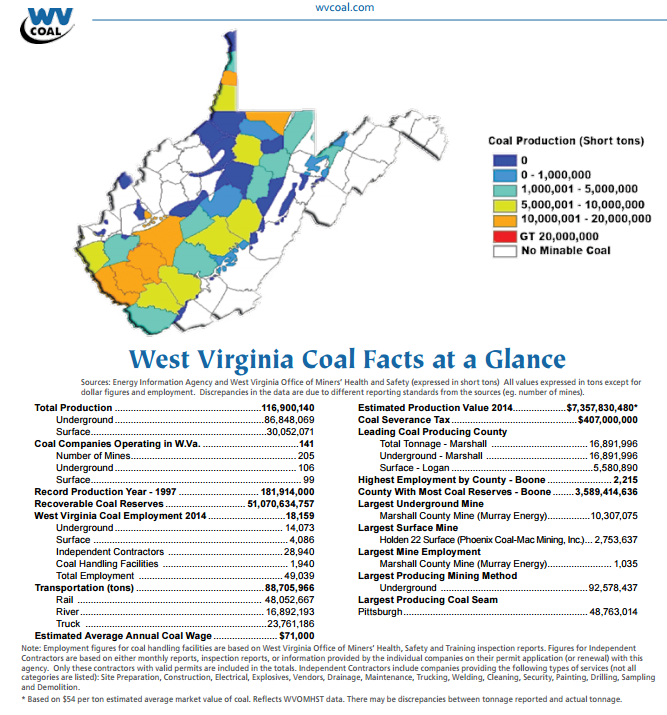Coal industry sheds 21% of its West Virginia jobs, no longer state’s largest industrial employer
West Virginia shed more industrial jobs over the past twelve months than at any year since the end of the recession, according to a new report in the 2017 West Virginia Manufacturers Register®, an industrial database and directory published by Manufacturers’ News.
According to the report, West Virginia lost 3,243 jobs between August 2015 and August 2016, a 4.3% decline. West Virginia is home to 1,696 industrial companies employing 72,422.
Coal leads W.Va. job losses
The job losses were led by West Virginia’s coal industry, which shed 1,861 jobs or 21%, falling from its top spot as the state’s largest industrial employer within the space of the past year. Coal mining now ranks third in the state for industrial jobs, employing 7,184.
Chemical manufacturing now employs the most in the state; in 2nd place, industrial machinery loses 7% of its jobs
Chemical manufacturing now accounts for the most industry jobs in West Virginia, employing 7,475, with no significant change reported over the year. Second-ranked industrial machinery accounts for 7,251 jobs, down 7% over the past year.
Job losses in West Virginia were offset by gains in paper products, up 11%; fabricated metals, up 5.7%; and medical instruments, up 2.8%.
MNI reports declines were largely felt in the state’s Western region, which lost 7.8% of its industrial employment, and now accounts for 30,648 jobs. Employment fell 2.4% in West Virginia’s Southern region to 5,280 jobs, and declined 1.7% in the North to 36,494 jobs.
“Shrinking demand and plunging prices continue to decimate West Virginia’s coal industry, and tight regulation as well as a dearth of skilled workers have made it difficult for other sectors to offset those losses,” says Tom Dubin, President of MNI, which has been surveying industry since 1912.
Coal once provided six-figure incomes straight out of high school, but those livelihoods are drifting away
Last year, Oil & Gas 360® interviewed Keith Burdette, West Virginia’s Secretary of Commerce, who discussed the devastation the Obama administration’s war on coal has had on his state.
“If you live in southern West Virginia and were willing to go underground and mine for coal, you could have earned six figures straight out of high school if you were willing to work overtime. So now we we’re trying to convince them to go back to school, incur some debt, and then make half as much money as they used to. So it’s not just an economic challenge, it’s a cultural challenge too,” Burdette told Oil & Gas 360®.
“Now, I do happen to believe that challenges present an opportunity to create diversity in the coal regions,” Burdette said. “But it’s not going to be easy for many of us. It’s going to require a lot of investment to get the infrastructure in place because everything is currently suited for the coal industry. I don’t want to sound too needy here, but I think the government kind of owes it to us. And I’m not meaning just West Virginia, I mean the whole region. The [government] policy is changing the livelihoods of many, many people. And they need to recognize the fact that their changes are expected to come along pretty quickly, and they need to give hope to those people who are watching their livelihoods drift away from them.”


